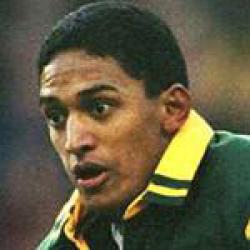
Published date
17 November 2004
Rugby developed as a sport in South Africa in the late nineteenth century. It is said to have become so popular that a temporary cease-fire was called for during the Anglo-Boer War so that a match could be played between the British and the Boers. The first series that the British lost against the South African team was in 1903. This started a winning streak as South Africa did not lose a single series until 1956.
The game of ruby developed along with the political ideology of apartheid, and soon became representative of the exclusion that the Black majority faced from South African society. Not only did South Africa exclude Black players from their teams, but international teams playing in South Africa felt compelled to do the same. After the Sharpeville Massacre in 1960, the South African rugby team, known as the Springboks, became the target of international protest. The All Blacks launched a "No Maori's No Tour" campaign prior to their arrival in South Africa in the same year. They cancelled a tour some years later because of the South African refusal to allow Maori rugby players into the country.
Like all other institutions in South Africa, rugby unions were segregated. Due to increasing international pressure, White and Black rugby unions were merged, leading to the inclusion of Errol Tobias, a Black player, in the national team. By 1992, with the dismantling of apartheid taking place, the Springboks were readmitted to international rugby. In order to address the racial imbalances of the past, the ANC-led government has encouraged a policy of transformation, by which a number of Black players should be included in the team. In 2004, Breyton Paulse, a Black rugby player was omitted from the Springboks prior to a test with England. The ANC Youth League challenged this decision, stating that "transformation cannot be put in reverse. Attempts to keep rugby as an exclusive sport for Whites will never work". On 17 November 2004, Paulse was included in the national team.
Breyton Paulse is known for his tremendous speed on the pitch. He was selected for both the 2003 and 2007 World Cup finals, however only as a reserve for the latter final. He has played for both the French Clermont Auvergne and the local Stormers and was named as the player of the year in 2000.
References:
Breyton "Breytie" Paulse [online] Available at: whoswhosa.co.za [Accessed 10 November 2009]
Breyton Paulse [online] Available at: en.wikipedia.org [Accessed 10 November 2009]
Gilbert, M. Transformation Whip Cracked. News.24. 17 November 2004. [online] Available at: news24.com [Accessed 10 November 2009]
South African National Rugby Union [online] Available at: en.wikipedia.org [Accessed 10 November 2009]